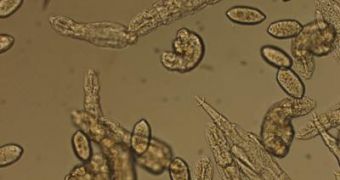In animals the genetic material is inherited from the parents after conception. No other later action, except for rare parasitic infections that can modify your genetic material by inserting some of their DNA strands, can alter your DNA. But in bdelloid rotifers, a microscopic freshwater animal, such events happen all the time. Its DNA appears to contain a series of genes transferred from bacteria, fungi and even plants.
The discovery was made by Irina Arkhipova and Matthew Meselson from the MBL's Josephine Bay Paul Center from Harvard University, assisted by graduate student at Harvard, Eugene Gladyshev.
"It is quite amazing that bdelloids are able to recruit foreign genes, which were acquired from remarkably diverse sources, to function in the new host. Bdelloids may have the capacity for tapping into the entire environmental gene pool, which may be of (evolutionarily) adaptive significance during expansion into new ecological niches, and may even contribute to bdelloid speciation", says Arkhipova.
Over a period of 40 million years bdelloids evolved into more than 360 species by incorporating foreign DNA picked up from the environment and from other bdelloids. How on Earth they managed to do that is anybody's guess. Usually, in animals the germ line is protected from the intrusions of foreign DNA by non heritable body cells, albeit bdelloids have no environmental exchange protection at all.
One reason would be the fact that bdelloids are able to survive total desiccation, which can kill most of the organisms on Earth. If water can no longer be found in the environment, then the bdelloids enter in an indefinite suspended dehydrated state, but come back to life as soon as water returns. During the desiccation stage the bdelloids suffer membrane and DNA damage in the rotifer. This enables foreign DNA to enter the germ line, becoming incorporated in the original DNA of the bdelloids once they are rehydrated.
The research team also showed that bdelloids are extremely good at recovering from the effects of ionizing radiation which breaks up the DNA code. The rotifer repairs the DNA after exposure to ionizing radiation, due to their unique ability to undergo desiccation. "The effects of radiation and desiccation may be quite similar and involve damage to chromosomal DNA as well as membranes", Arkhipova says.
Foreign genes inside that of the bdelloid genomes appear to be clustered near the tips of the chromosomes and could have been picked up during desiccation. "It may be occasionally added to deprotected telomeres, as we previously demonstrated for mobile elements. Or it may simply not be selected against as efficiently as the more deleterious DNA insertions into the central, gene-rich regions of the chromosome", Arkhipova says.

 14 DAY TRIAL //
14 DAY TRIAL //